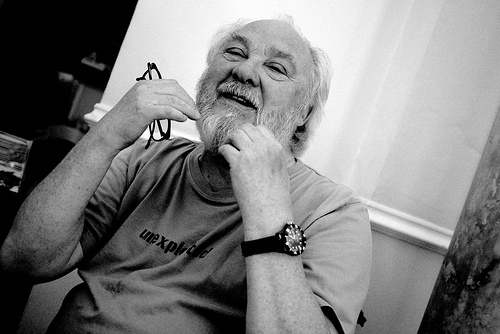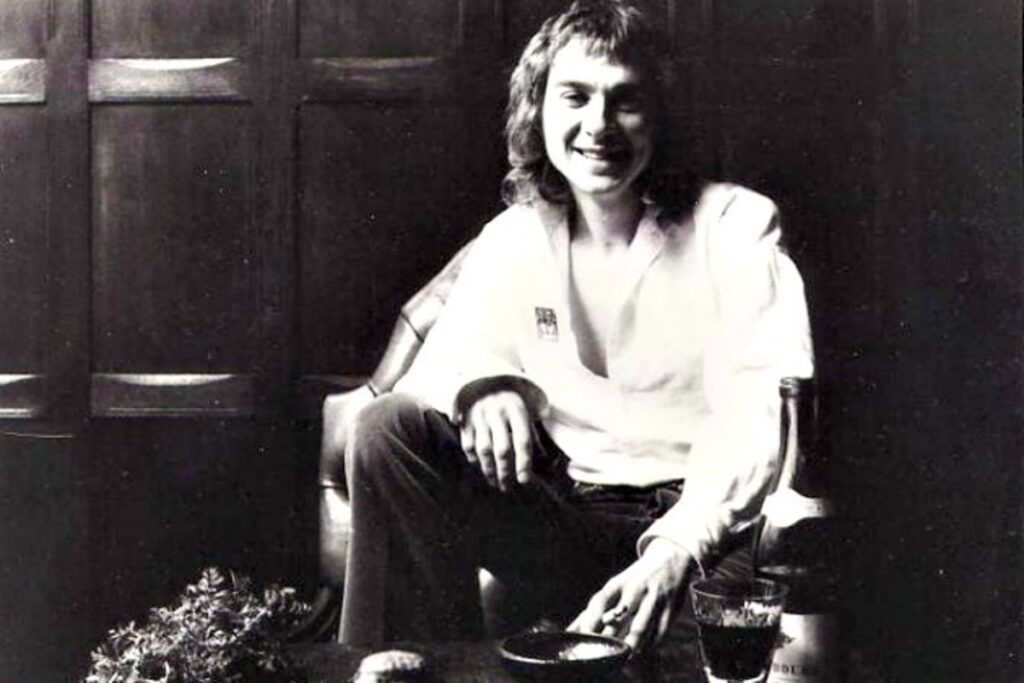
Peter Sinfield was born Peter John Sinfield on December 27, 1943, and was an English poet, songwriter, and creative visionary who played a pivotal role in shaping the landscape of progressive rock. Best known as the co-founder and lyricist of King Crimson, Sinfield’s influence extended far beyond his work with the band.
His lyrical craftsmanship and poetic sensibilities defined a genre that sought to push the boundaries of conventional rock music, blending intricate storytelling with complex musical compositions. Sinfield’s enduring legacy is tied to the profound impact of In the Court of the Crimson King, widely hailed as one of the first and most influential progressive rock albums.
Early Life and Inspiration
Peter Sinfield was born in Fulham, London, during the tumultuous years of World War II. His father was absent for much of his early life, and Sinfield was raised by his mother and her friends, an unconventional upbringing that would later inform his artistic worldview. A voracious reader from a young age, Sinfield found solace and inspiration in literature, particularly in poetry. The works of William Blake, T.S. Eliot, and Samuel Taylor Coleridge left a lasting impression on him, fostering a love for vivid imagery and symbolic language.
Sinfield’s early exposure to a wide range of music also shaped his creative development. While he was not a musician in the traditional sense, his intuitive grasp of melody and rhythm complemented his poetic sensibilities, making him an ideal collaborator in the music world.
The Formation of King Crimson
In the late 1960s, Peter Sinfield met guitarist Robert Fripp through a mutual friend, Ian McDonald. The meeting proved serendipitous, as the two men shared a vision for a musical project that would transcend the limitations of pop and rock. Fripp, a virtuoso guitarist with a penchant for innovation, saw in Sinfield a kindred spirit capable of providing the lyrical depth that his music demanded. Together, they co-founded King Crimson in 1968, along with McDonald, bassist Greg Lake, and drummer Michael Giles.
Sinfield’s role in King Crimson was unique. While he did not play an instrument, he was deeply involved in shaping the band’s identity. Beyond writing lyrics, he contributed to the conceptual and visual aspects of their work, designing album covers and stage lighting to create an immersive experience. His creative input ensured that King Crimson was not just a band but an artistic statement.
In the Court of the Crimson King
Released in October 1969, In the Court of the Crimson King marked King Crimson’s debut and was an immediate sensation. The album’s blend of rock, jazz, and classical influences, combined with Peter Sinfield’s enigmatic lyrics, captivated listeners and critics alike. Songs like “21st Century Schizoid Man,” “Epitaph,” and the titular “The Court of the Crimson King” showcased Sinfield’s poetic brilliance.
.
.
The lyrics of the album were steeped in allegory and rich imagery. “21st Century Schizoid Man,” for instance, offered a scathing critique of modernity and its dehumanizing effects, delivered with a sense of urgency that matched the song’s ferocious musical intensity. On the other hand, “Epitaph” conveyed a haunting meditation on existential despair, with lines like:
The wall on which the prophets wrote
Is cracking at the seams.
Upon the instruments of death
The sunlight brightly gleams.
Sinfield’s words elevated the album to a level of artistic sophistication that set it apart from its contemporaries. The cover artwork, also conceptualized with his involvement, became iconic, embodying the album’s emotional and thematic depth.
Expanding Horizons: Post-King Crimson
Peter Sinfield remained with King Crimson through their early albums, contributing lyrics to In the Wake of Poseidon (1970), Lizard (1970), and Islands (1971). However, creative differences between Sinfield and Fripp eventually led to his departure from the band in 1972. Despite this, Sinfield’s influence on King Crimson’s early work remained a cornerstone of their legacy.
Following his departure, Sinfield embarked on a solo career and explored collaborations with other artists. His solo album, Still (1973), showcased his talents as a songwriter and performer. While it did not achieve the same level of commercial success as his work with King Crimson, Still reflected his lyrical depth and experimental spirit.
Sinfield also found success as a lyricist and producer for other musicians, most notably working with Emerson, Lake & Palmer (ELP). His contributions to ELP’s albums, including Brain Salad Surgery (1973), further cemented his reputation as one of progressive rock’s most imaginative lyricists.
Legacy and Influence
Peter Sinfield’s impact on music and poetry cannot be overstated. As a lyricist, he brought a level of intellectual rigor and poetic beauty to progressive rock that elevated it to an art form. His work inspired countless musicians and writers to think beyond the boundaries of genre and convention.
.

.
Sinfield’s approach to lyrics—emphasizing symbolism, metaphor, and narrative complexity—helped establish a template for progressive rock. Bands like Genesis, Yes, and Pink Floyd, while distinct in their styles, shared Sinfield’s commitment to integrating music and storytelling. Beyond the progressive rock genre, his influence can be seen in the works of later artists who sought to merge literary and musical forms.
Recognition and Reflection
In later years, Peter Sinfield received numerous accolades for his contributions to music and literature. He often reflected on his career with a mix of pride and humility, emphasizing the collaborative nature of his success. While he was sometimes critical of the pressures and conflicts that arose during his time with King Crimson, he never diminished the importance of the music they created together.
Peter Sinfield’s death on November 14, 2024, marked the end of an era. Tributes poured in from around the world, with musicians, critics, and fans celebrating his legacy. Many cited In the Court of the Crimson King as a defining moment in music history, a testament to Sinfield’s enduring genius.
Conclusion
Peter Sinfield was more than just a lyricist; he was a visionary who redefined the possibilities of rock music. His poetic sensibilities, combined with his commitment to innovation, made him a cornerstone of the progressive rock movement. From his seminal work with King Crimson to his solo endeavors and collaborations, Sinfield’s career was a testament to the power of words and imagination.
As progressive rock continues to inspire new generations of musicians, Peter Sinfield’s legacy remains a beacon of creativity and artistic integrity. His work invites us to explore the depths of our own imagination, reminding us that music and poetry, at their best, can transcend the ordinary and touch the sublime.
Check out King Crimson on Amazon by clicking here.
If you found this interesting please share it with your friends and family, and check out some of our other articles on Musicians who Died in 2024.
.

